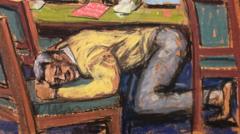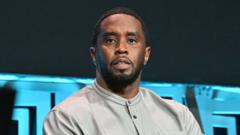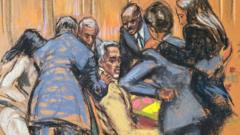Former insiders provide chilling accounts of Sean "Diddy" Combs' behavior during his rise to fame in the 1990s. As he awaits trial on sex trafficking charges, testimonies unearth a troubling culture at Bad Boy Records, marked by allegations of drugging, assault, and a pervasive atmosphere of intimidation.
From Hitmaker to Criminal: The Dark Legacy of Sean 'Diddy' Combs' Empire

From Hitmaker to Criminal: The Dark Legacy of Sean 'Diddy' Combs' Empire
A troubling look into the allegations and culture surrounding Sean Combs' Bad Boy Records reveals a world filled with sexual misconduct, threats, and exploitation.
In a stark departure from his celebrated legacy, Sean "Diddy" Combs, once a towering figure in the hip-hop world, faces a slew of serious allegations that paint a portrait of a toxic and abusive empire. Four years shy of three decades since the launch of Bad Boy Records, insiders associated with the label have begun to come forward with unsettling testimony about the environment fostered under Combs' leadership during the 1990s.
A former executive, Daniel Evans, recalls an incident in 1997 when Combs threatened a colleague, saying, “I could hire someone to kill you, and nobody would know.” Evans remarked how the immense wealth Combs acquired began to alter his character, noting that he had just received a massive $6 million reward for the label's success, which was anchored by iconic artists such as The Notorious B.I.G. Today, that once-thriving empire is stained with accusations of sex trafficking, drugging, and assault, as Combs currently awaits trial on these charges, all of which he denies.
In its investigative report, the BBC uncovered a web of alarming behaviors by Combs, shared by over 20 former associates. Allegations include intimate encounters occurring right in the studio, with accounts of executives walking in on Combs in compromising situations. One account describes an instance where Combs requested an employee to obtain condoms. Further unsettling reports reveal that artists and staff would fly women into the studio expressly for sexual encounters, a practice that Evans confirmed was hidden under the guise of legitimate travel expenses.
As the allegations pile up, many reflect on their time spent in that vibrant yet chaotic environment filled with young talent and a party-like atmosphere. Felicia Newsome, who managed the studio from 1994 to 2000, acknowledged that while such misconduct wasn't formally reported, it was sadly commonplace during that era. The pervasive culture was one of indulgence, with demands for alcohol, parties, and unwarranted sexual advances.
In a potential turning point, Combs' conduct has led to various lawsuits, including that of a woman who alleges he raped her following a promotional party. His legal team has vigorously defended him, labeling the allegations as baseless and claiming to have insufficient details to substantiate the BBC's findings.
However, amid the denials, former associates are plagued by a mix of disbelief and realization as the allegations seem to clash with their memories of Combs. One ex-employee, Jeffery Walker, expressed shock over the claims, insisting his experiences at lavish events did not align with what is now being reported.
Yet not all remarks are of bewilderment; Daniel Evans offers a sobering reflection as he grapples with his earlier impressions of Combs' temper and charisma, recognizing that wealth may have unveiled the darker aspects of his nature. As the world eagerly awaits the trial's developments set for May, the legacy of Sean "Diddy" Combs continues to hang in the balance, with many questioning if the man they once knew was always masking a more sinister side.



















